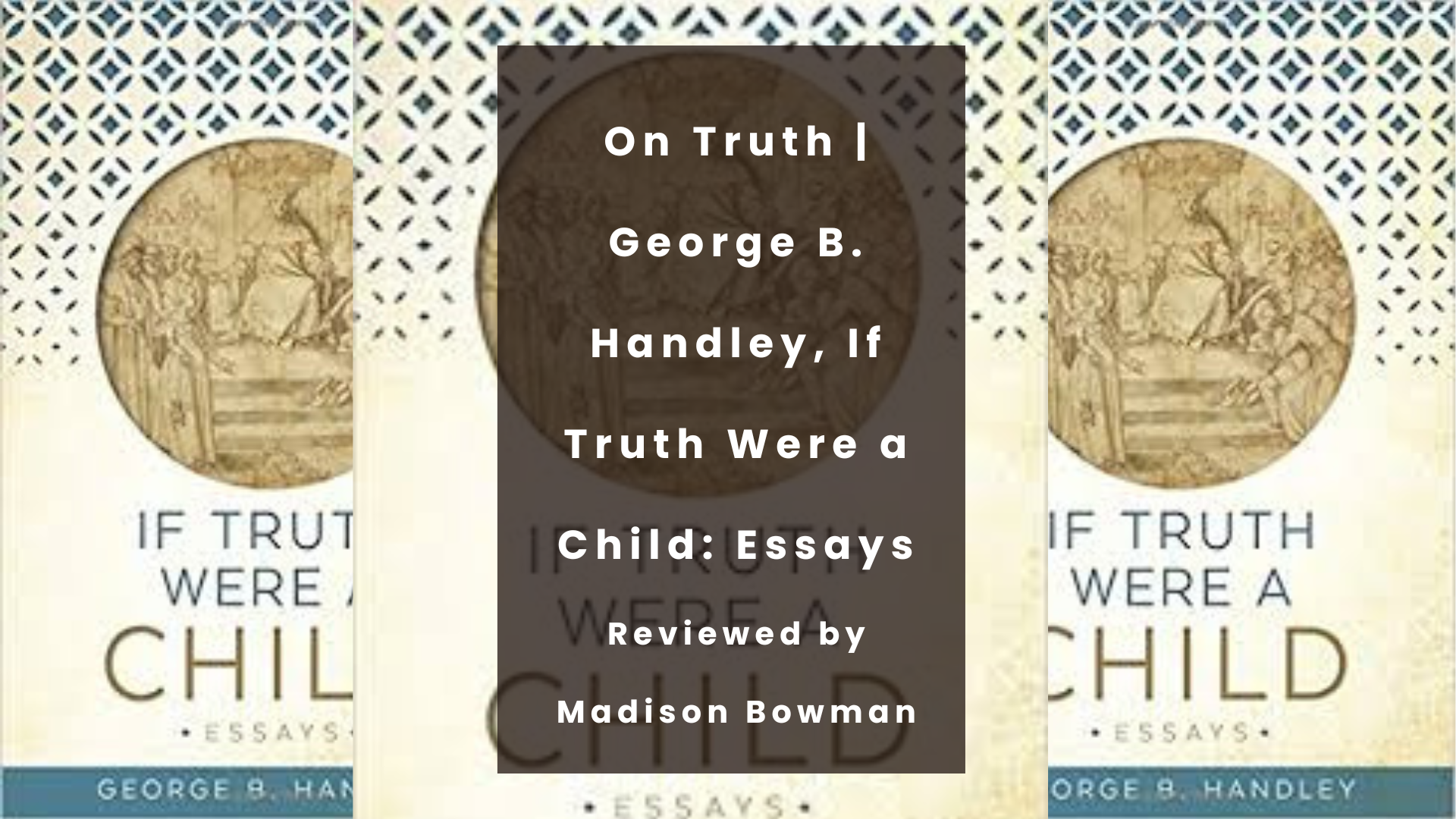Articles/Essays – Volume 52, No. 3
On Truth | George B. Handley, If Truth Were a Child: Essays
Taking the word “essay” in its root meaning as “an attempt,” BYU humanities professor George Handley’s new book of essays If Truth Were a Child comprises the attempts of the author to reconcile intellectual curiosity and criticism with religious faith. The result is an illuminating perspective on how Latter-day Saints can move forward thoughtfully and compassionately in a polarized and polemical culture.
Handley grew up in an unconventional LDS household, with parents he describes as “[not] exactly the most active or model Latter-day Saints, [though] anyone who knows them, knows them to be profoundly Christian.” In the most personal essay of the collection, “On Criticism, Compassion, and Charity,” he describes his childhood with great fondness and admiration for parents who were patient, open-minded, and committed to exposing themselves and their children to cultural experiences and diverse people.
As a teenager, Handley lost one brother to suicide, and this loss comes up in several essays as a catalyst for receiving spiritual comfort, personal revelation, and a deeper understanding about the wide range of struggles faced by fellow Church members, no matter how homogenous they may seem. His other brother is gay, and when Handley discusses painful policies and cultural elements of the church, it’s clear he’s felt that pain personally.
Though intellectually rigorous, Handley is clearly much more preoccupied with living the doctrines of the gospel than with knowing them. Religion, he says, is more about staying “focused on being as true to truth as I am on knowing it.” This is the most refreshing aspect of the book: Handley is willing at all points to accept that he often doesn’t have the answers to the most pressing questions of the Latter-day Saint truth-seeker. “I don’t always understand how I should feel about every controversy or doctrine, but it is not hard to receive revelation about what I should think of Christ or how I ought to be living my life.”
Indeed, Handley expressly encourages readers to be more willing to say “I don’t know” and to focus on living up to the principles and covenants they already have. In everything, he values the primacy of relationships: with God, among families, and as a body of Saints. He says, “Truth is no trophy you can hold up. Its value isn’t in possessing it. Its value is the love we muster to build relationships in its pursuit.”
In the essay “A Poetics of the Restoration,” Handley makes an argument for why the humanities are not only useful in understanding and applying gospel principles, but are actually essential: “Because the passion, or suffering, of Christ is compassion—a suffering with all of humanity—cultivating the mind of Christ means developing an increasingly profound understanding of how the gospel relates to the diversity, range, and levels of human experience.”
Our studies of secular subjects, particularly the humanities, give us what Handley terms an “amplified vision of possibility” that allows us to more fully recognize the relevance of our faith to the world, and the personal and cultural weaknesses we bring with us in our understanding of the gospel of Jesus Christ: “Belief in Christ . . . requires vigilant awareness of what we do not know and cannot be separated from a vital interest in the world, in the affairs of men and women, and in the many cultural expressions that shed light on the human experience.”
In the title essay, Handley encourages the reader to handle political conflict with greater charity and willingness to learn. He says:
As the world clamors for our attention, we do well to remember that we don’t need coherent arguments so much as self-coherence, and until and unless we give our attention to this essential work of knowing and healing ourselves, our arguments about the world and all of its problems are likely to be based on faulty perception. In other words, our tendency to see the world polemically is a symptom of our failure to see ourselves and others wholly. . . . Faith is both a trust in God’s light to assist me and a distrust in my own capacity to make sense of things. To be religious means I must be willing continually to self-examine and self-question.
In another essay, Handley writes about how to find renewal in church attendance, especially when our religious practices begin to feel stale or we feel out of place among fellow church members. Other pieces range from textual analyses of the Book of Mormon to discourses on finding wonder in the world.
Handley’s intellectual curiosity, commitment to charity above all, and forthright humility make If Truth Were a Child an inspiring and mind-expanding read for any Latter-day Saint. Handley gives hope and encouragement to those who might not see a place for themselves in the culture of the Church; he is understanding of this position, but immensely encouraging toward increased commitment: “The question . . . becomes whether or not we are willing to take the moral risk of seeing an institution through to realize its potential.” Handley offers a model for how a person can find balance, peace, and delight in the world as a disciple, a scholar, and a seeker of truth.
George B. Handley. If Truth Were a Child: Essays. Provo: Neal A. Maxwell Institute for Religious Scholarship, 2019. 253 pp. Paperback: $19.95. Kindle: $9.99. ISBN: 9781944394738.


 Back to full Issue
Back to full Issue

